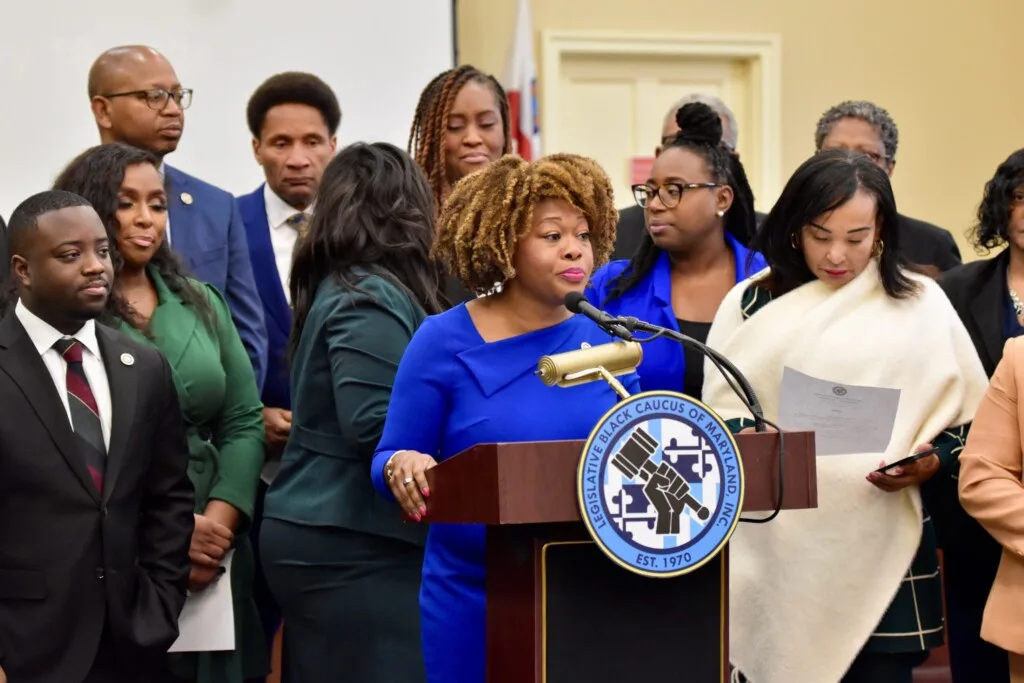
Expanding the authority of the state’s Prescription Drug Affordability Board is among priorities for the Legislative Black Caucus of Maryland during the 90-day session, members said Thursday.
Jennifer White Holland (D-Baltimore County), who announced the caucus’ agenda during a press conference, said the proposed legislation will be called the Lowering Prescription Drug Costs for All Marylanders Act.
“Maryland patients are being forced to skip doses, ration their medications, or simply leave their prescriptions on the pharmacy counters due to cost,” said White Holland, who has a master’s degree in public health. “We know all too well that these rising costs are a burden to all Marylanders and specifically for the African American community, who face persistent racial health inequities.”
White Holland said she and Del. Bonnie Cullison (D-Montgomery) will be lead sponsors of bill in the House. In the Senate, the bill will be sponsored by Sens. Brian Feldman (D-Montgomery) and Dawn Gile (D-Anne Arundel).
Currently, the board is beginning work to assess the affordability of prescription drugs and require lower prices for drugs under local and state government health care plans. A leading advocacy group, the Maryland Health Care for All Coalition, has urged the legislature to lower drug prices for all Marylanders.
Feldman, chair of the Senate Education, Energy and the Environment Committee, and Del. Joseline Peña-Melnyk (D-Anne Arundel and Prince George’s), chair of the Health and Government Operations Committee, led efforts for the General Assembly to create the affordability board in 2019.
However, the board got a slow start after former Gov. Larry Hogan (R) vetoed legislation to fund its initial work. In 2020, the COVID-19 pandemic and economic uncertainty also hampered progress.
Also a part of the caucus priorities are at least two pre-filed bills that focus on education – Senate Bill 161 and House Bill 200 – sponsored by Sen. Alonzo Washington (D-Prince George’s) and in the House by Del. Jheanelle Wilkins (D-Montgomery), chair of the Black Caucus.
The focus of the legislation is to expand the number of designated community schools in school systems with fewer than 40 schools — which is part of the Blueprint for Maryland’s Future education reform plan.
Community schools receive concentration of poverty grants and partner with local organizations to help educators, parents and a child’s family. Some services that community school students can draw on include before- or after-school tutoring, English language learner courses and food pantries.
Each community school has a school coordinator and a health care practitioner.
A hearing for the Senate bill is scheduled for Wednesday before the Budget and Taxation Committee and for the House bill on Jan. 30 before the Appropriations Committee, according to the General Assembly website..
Another bill filed would create an ombudsman office within the Office of the Attorney General to field concerns about individuals held by and matters related to the Department of Public Safety and Correctional Services.
Del. Debra Davis (D-Charles) is filing the measure, House Bill 297, this year — the fifth time that lawmakers will consider it. It is cross-filed as Senate Bill 134,sponsored by Sen. Shelly Hettleman (D-Baltimore County).
“The ombudsman will offer a voice to those persons behind the wall and their families and be able to investigate conditions at the facilities,” Davis said. “Improving the [correctional] system can save Marylander’s hundreds of thousands of tax dollars paid in lawsuits and jury verdicts.”
Attorney General Anthony Brown (D) continues to support the bill, which passed last year in the Senate but died in the House Rules Committee.
A hearing is scheduled on the Senate version Feb. 7 before the Judicial Proceedings Committee.


